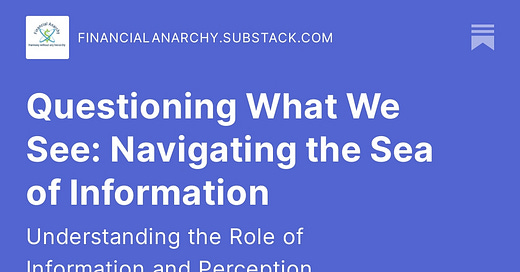Questioning What We See: Navigating the Sea of Information
Understanding the Role of Information and Perception.
In a world where information and disinformation are often indistinguishable, it is crucial that we approach all sources of information with a critical eye. As Albert Einstein once said, "The important thing is not to stop questioning. Curiosity has its own reason for existing." It's important to question not just what we see, but who is collecting, processing, storing, and distributing it.
Our ability to analyze and interpret information is heavily influenced by the programming we've received throughout our lives. As Neil deGrasse Tyson notes, "We are all connected to each other biologically, to the earth chemically, and to the rest of the universe atomically... small changes in one part of the system can propagate in unexpected ways throughout the rest." Our individual experiences and biases shape our perception of the information we encounter.
This phenomenon is particularly evident in the stock market, where different investors interpret the same information in completely opposite ways. As Warren Buffett famously said, "In the world of business, the people who are most successful are those who are doing what they love." This suggests that the way we use and interpret information is what ultimately gives it value and determines our actions.
Ultimately, it is up to us to carefully evaluate the sources of the information we encounter and use our critical thinking skills to determine its veracity. As Carl Sagan once said, "Skepticism enables us to distinguish fancy from fact, to test our speculations." By being skeptical and discerning, we can navigate the sea of information and arrive at more accurate conclusions.




